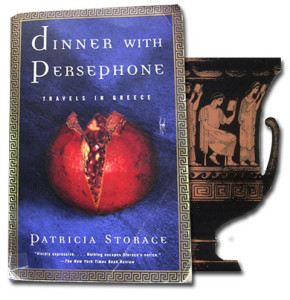
©2005 UrbisMedia
Is it because my father always maintained that there were a few Greek corpuscles floating around in our Italian blood that I have long had a special affection for Greece? Dad’s people came from near Naples ( newpolis ), a city whose Greek-rooted name owes to the people who knew a beautiful setting for a city when they saw one, and took advantage of it. A lot of family names in this region are Greek-influenced, and our might have been one of them.
Or, was it because in Fr, White’s Classical Greek class in high school we translated big chunks of The Odyssey , making it my all-time favorite book, that I have a philhellenic ( filws + ellas ) streak in me? For three academic years we sailed with Odysseus and his fellow Ithicans through the waters of the Mediterranean, helped him blind Polyphemous, got stoned on lotus, and struggled against the wiles of the Sirens and Circe. It would make a Greek of any boy with a hunger for adventure and faraway shores.
But I am not Greek. Neither is Patricia Storace (neither was Lord Byron, for that matter). But her approach to Greece, one in which she seeks out and elucidates the presence and immediacy of Greek history and myth as they poke through and season everyday life, in thought, speech, ceremony and everyday deeds is precisely how I would wish to delve into this culture. On language, for example, she offers that “Greek is not a voluptuous language, or a lilting one, but stoney and earthy, a language full of mud, volcanic rock, and glittering precious stones.” She is referring to modern Greek, of course, but we could not say what Homer or Pericles sounded like when they spoke “classical” Greek; they way we spoke it in Greek class might have been unintelligible to them. But both versions cannot be heard without English cognates sticking out of them like pot shards out of an archeological dig. Acropolis ( akropwlis ) in the classic, or kafenio (what a Greek Starbucks would be), and thousands of word prefixes ond suffixes—peri-, epi-, philos- and –sophus—are the archeology of our speech. Storace employs both versions of the language to enrich her narrative.
What makes this a special book is that it is not just travelogue, but it is good story-telling of the experience of engaging another culture. Storace sifts history and anthropology in the experience of settling in (“I lived in Athens, at the intersection of a prostitute and a saint.”), or setting up a bank account, in which she receives a lesson in the male chauvinism of some Greek men (she gets propositioned a few other times, once by a man who will keep her in his house if she would like to be “kept,” another time by a drunken sailor who boasts of Olympian feats of coitus. Storace remains un-flatters and and dis-interested, but not un-interested in Greek men. She seems to enjoy relating on festive practice of transvestism in which the most popular manifestation she discovered was a “. . . room . . . crammed with whisky-sipping men, smoking relentlessly, in the Greek style, many in various stages of pregnancy.
That vignette merits relating because the author often finds that the Greece of the great heroes and heroines of antiquity contrast with the present day. Like other countries with long ago empires, or “golden ages,” Greece lives, like Egypt, off the bones of its ancestors. Like Egypt, the contemporary Greek is not likely a direct descendant of a pharaoh or a philosopher, of an Ahkenaten or an Alexander. There is a sense in her descriptions that the present age in Greece is somewhat like a son who has a very famous father whose achievements he will never exceed.
So what comes through in Dinner With Persephone is a Greece composed mostly of a folk culture that sits upon the ruins and less so the reputation of its classical antecedents. Aside from the Athens-Piraeus metropolis Greece is a country of villages and islands scattered around the Aegean and Mediterranean. Its principal faith is Eastern Orthodox sometimes mixed with folk elements like evil eyes and talismans, and its cuisine is principally simple, coarse, and flavored with the tastes of the Eastern Mediterranean, and the men seem to prefer dancing with one another. Greece has had little of its own hegemony and was ruled and dominated by the Ottoman Empire until the early part of this century and retains perennial border issues with neighboring Turkey and the Macedonians to the north.
But Storace sums it up better:
“Athens is a city that brims with people, but can often seem like no one lives in; it has a haunted quality. All the unseen worlds of the past, classical, medieval, Ottoman (of which there are few reminders left, except in the language, because the Greeks so hate the evidence), surround you, above and beneath. The underworld is always present, the world of the dead. And the jumble of houses–abandoned nineteenth-century mansions in odd corners, the tiny houses that were built at the turn of the century by villagers and look exactly like village houses, the withered boxes built for refugees from Asia Minor in the 1920s, now overshadowed by large apartment buildings on either side like grown-ups holding the hands of a child about to cross the street—gives Athens the feeling that everyone here is both himself and his own ghost.”
Storace is an astute reporter who seems always able to place herself in the circumstance of a story, and can even become a part of that story without corrupting it, but helping to bring out its narrative and the essences of its characters. It is travelogue as close to be “classical” as the form can achieve. It delivers on the Greek kalo taxidi to have a “good trip.” It’s the next best thing to being there.
___________________________________
©2005, James A. Clapp (UrbisMedia Ltd. Pub. 9.7.2005)
